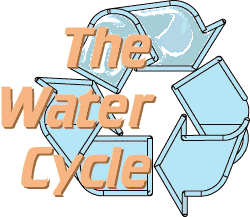
Introduction

Introduction
Precipitation, evaporation, and transpiration are all terms that sound familiar, yet may not mean much to you. They are all part of the water cycle, a complex process that not only gives us water to drink, fish to eat, but also weather patterns that help grow our crops.
 Water is an integral part of life on this planet. It is an odorless, tasteless,
substance that covers more than three-fourths of the Earth's surface. Most
of the water on Earth, 97% to be exact, is salt water found in the oceans.
We can not drink salt water or use it for crops because of the salt content.
We can remove salt from ocean water, but the process is very expensive.
Water is an integral part of life on this planet. It is an odorless, tasteless,
substance that covers more than three-fourths of the Earth's surface. Most
of the water on Earth, 97% to be exact, is salt water found in the oceans.
We can not drink salt water or use it for crops because of the salt content.
We can remove salt from ocean water, but the process is very expensive.
Only about 3% of Earth's water is fresh. Two percent
of the Earth's water (about 66% of all fresh water) is in solid form, found
in ice caps and glaciers. Because it is frozen and so far away, the fresh
water in ice caps is not available for use by people or plants. That leaves
about 1% of all the Earth's water in a form useable to humans and land
animals. This fresh water is found in lakes, rivers, streams, ponds, and
in the ground. (A small amount of water is found as vapor in the atmosphere.)